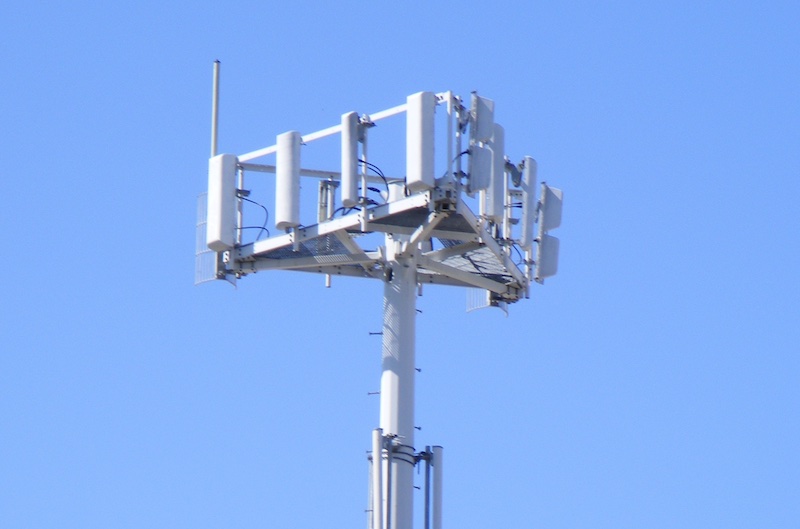A pair of bills that would profoundly deregulate the placement of cell-phone towers and antennas – in essence giving the telecom companies complete control over where these facilities can go and overriding most local regulations – are moving quickly through the state Legislature with almost no news media attention.

The measures would allow companies full discretion to place antennas on any public light or utility poles anywhere in the state and contain no effective considerations for public health.
The measures, nurse and health advocate Catherine Dodd told me,
Will allow corporate Telecom carriers to put wireless telecom facilities, (towers and antennas) wherever they choose with no local control, or public input. That includes in front of homes and as close as 6 feet outside windows in parks and near schools.
SB 556, by Sen. Bill Dodd (who represents a district that includes much of the North Bay), sailed through two committees with bipartisan support and only one No vote. It’s now headed to the Senate floor.
The measure is sponsored by Crown Castle, which builds cell-phone towers.
State Sen. Scott Wiener, who represents San Francisco, voted in favor.
A companion bill, AB 537, by Assemblymember Bill Quirk, who represents the Hayward and Fremont area, would require cities and counties to quickly approve applications for new cell-phone facilities. It passed the Communications Committee and the Local Government Committee without a single dissenting vote.
Assemblymember Phil Ting, who is on the Communications Committee, voted in favor.
The impetus for the bill (of course) is telecom profits. But legislators have also been hearing from parents who complain that during COVID, their kids aren’t getting reliable Internet access.
The telecoms say that putting new antennas up (and adding 5G facilities) will help address that problem.
Dodd, who worked in the Clinton Administration and for eight years ran San Francisco’s Health Service System, disagrees with that analysis.
In fact, she argues, the bill could undermine efforts at municipal broadband – which is an actual solution to the digital divide:
SB 556 will NOT bridge the digital divide, it will put the corporate Telecom carriers in charge of regulating wireless telecom facilities, (towers and antennas) and will give them access to every pole and signal light — so they can make money charging higher and higher rates for internet services. Telecom carriers need to be regulated. Municipalities can ensure that there is affordable and even subsidized access to the internet – if SB 556 passes that can’t happen
5G does not facilitate voice data or internet connectivity – it only increases download speeds for video (like gaming), it’s unreliable in bad weather, it’s not cyber secure, and it contributes to climate change because it requires electricity to many more antennas.
California cities and counties need WIRED municipally operated BroadBand to and into the buildings: FASTER, SAFER, ENERGY EFFICIENT and CYBER SECURE. SB 556 will prevent municipal broadband!
As far as I can tell from my research, not a single news outlet has covered this bill.
So why is it going through the Legislature with no serious discussion or opposition?
Think about this:
In the past two years, AT&T has spent $250,000 taking state legislators on a fancy golf vacation to Pebble Beach (called The Speaker’s Cup.) In 2019 and 2020 alone, state records show, the company has donated $275,000 to the California Republican Party and $755,000 to the California Democratic Party. Gavin Newsom’s campaign for governor got $20,000 in AT&T money.
It’s hard to find a single state legislator who didn’t get money from AT&T.
Verizon gave $73,000 to the California Republican Party and $80,000 to the Democratic Party. Verizon also gave $10,00 to Newsom.
Many state legislators also got money from Sprint.
“This is a tough battle,” Dodd told me. “They have so much power and influence.”
The League of California Cities opposes this. So do some health advocates.
Here’s who’s in favor:
Bay Area Council, California Apartment Association, California Builders Alliance, California Building Industry Association, California Business Properties Association, California Retailers Association, California Wireless Association, CTIA, Greater Sacramento Economic Council, Orange County Business Council, Sacramento Regional Builders Exchange, San Francisco Chamber of Commerce, Silicon Valley Leadership Group, Verizon.
That’s pretty much a list of people who are on the wrong side of most issues.
And nobody in the Democratic Party is standing up to them to protect public health and safety.




